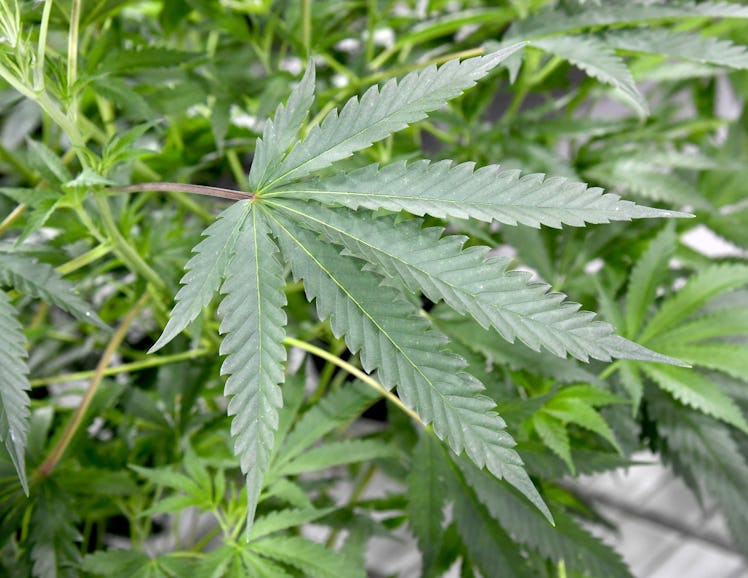
Experts Reveal How CBD Mellows Out Your Stress Levels Without Getting You "High"
You've probably seen a new ingredient advertised nearly everywhere lately, called CBD. It's popping up in bath bombs, massage oils, and even lattes in local coffee shops. Maybe you've heard a thing or two about CBD, like that it technically comes from the cannabis plant but it's not really the same thing as weed, and that it apparently relaxes the body from head to toe. But does CBD really help with stress, or is it just a strangely widespread placebo effect happening to, what seems like, every single person around you?
First of all, let's clear up what CBD is and what it isn't. According to Dr. Stuart Titus, CEO of Medical Marijuana, Inc., CBD, which stands for cannabidiol, is one of the hundreds of naturally occurring compounds in the cannabis plant. But the important distinction here, Titus tells Elite Daily over email, is that it's a compound in the plant that doesn't have any psychoactive effects on you when you ingest it — unlike THC, aka tetrahydrocannabinol, which is the compound in cannabis that does have those psychoactive properties and does get you high.
So, Titus explains, while many medical marijuana products are derived from cannabis plants that have high concentrations of THC, if you come across, say, a CBD oil at your local store, you can rest assured that that oil was made from high-CBD, low-THC cannabis plans — less than 3 percent THC in fact, says Titus. In other words, if you rub that oil into your skin, you're not exactly going to have that "lifted" feeling, nor are you likely to suddenly rediscover how much you love '90s cartoons and cereal.
But, Titus tells Elite Daily, while CBD won't get you high, he says it can definitely help you manage your stress, particularly on a physiological level. Here's what happens in your body when you consume CBD: According to Titus, the cannabis compound interacts with something in your body called the endogenous cannabinoid system, which basically helps to regulate your central nervous system development, as well as your body’s responses to internal and external factors and stressors. Through that interaction, Titus says, "CBD seems to have a potentially positive impact on one’s ability to cope with stress [and] to stabilize mood." In terms of CBD side effects, Titus says fatigue is a common one to watch for, and a 2011 medical survey found that, for people who have conditions like epilepsy, CBD has "a better side effect profile" compared to other treatments. In other words, the side effects overall are slim to none, so there's really no need to worry there. If you want to make absolutely sure that CBD is right and safe for you, talking to your doctor is always a good idea.
And while there's still plenty of red tape restricting consistent, reliable research on the potential health benefits of cannabis, the studies that have been done appear to be favorable. For instance, a review of research published in the journal Neurotherapeutics found that there's "considerable potential [for CBD] as a treatment for multiple anxiety disorders." This type of evidence is promising, sure, but as Dr. Esther Blessing, a psychiatrist and researcher at New York University, told NPR, "we need clinical trials to find out" just how effective and safe CBD really is for people.
Again, you've probably noticed CBD is available in so many different forms, and is pretty easily purchased at any given health store or pharmacy (or even coffee shop) in your area. But according to Brandon Nolte, owner of Healthy Hemp Oil and author of the book The Ultimate Guide to CBD Hemp Oil, it's best to make sure you know how much of the CBD compound you're actually getting in the product, as well as where exactly it's coming from — aka information you might not always easily find at something like a cafe or small eatery. Nolte tells Elite Daily that CBD oil should come from industrial hemp, which contains very low amounts of THC (the compound with psychoactive effects). "Some marijuana dispensaries may sell a form of CBD that is not extracted from hemp and may be extracted from plants that have a much higher THC level," Nolte says. "But as long as your CBD comes from hemp, it cannot make you high."
The laws surrounding CBD differ from state to state, Forbes reports, but according to Nolte, the low level of THC and its inability to get you high is essentially what allows these products to be legal in most jurisdictions. In other words, CBD, as long as you're getting it from a trustworthy source, is a safe and potentially effective way to relax and mellow out your stress levels, without the whole mind-altering aspect of cannabis.
This article was originally published on